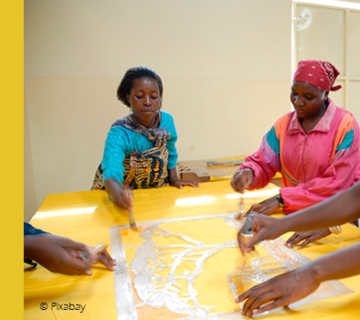Today, 14 March, the day we remember Chiara Lubich’s departure for Heaven, we publish some of her words, pronounced during the meeting of the “Movement for Unity in Politics” in Bern (Switzerland) on 4 September 2004. A reflection on the kind of ‘love’ necessary for universal fraternity to be possible.
Brotherhood can be achieved only through a special kind of love. It’s a love that is directed to everyone, just as God the Father sends sun and rain on the good and on the bad. It is not a love that is directed only to relatives and friends, and a few other people. It is directed to everyone, and this already requires effort. If we left here having resolved to love everyone we meet, and, if we are Christians, seeing Christ in them, because he will say: “You did it to me,” “You did it to me.” I think that would already be a great step forward because the Christian revolution would spread out from here.
Then this love we need to build fraternity, is not only tolerance, although it is tolerant; it’s not only solidarity, although it is solidarity too. It’s something different because it’s the very love of God. We Christians say it is the love poured into our hearts by the Holy Spirit. This love takes the initiative without waiting to be loved; it makes the first move, taking an interest in others (without bothering them, of course). It takes the initiative and does not wait to be loved. Usually people wait to be loved before loving. Instead it is a love which is first… and this brings a revolution. In fact, our Movement has reached the ends of the earth, not because of what we did, but due to a charism from God. If we leave here determined to love everyone, always being the first to love, without waiting…. Well, this is already Gospel life. Do you understand what the Gospel is? This is Gospel.
Then it’s not a sentimental or platonic love; it’s not a fleeting love, but a concrete love, which makes itself one with the person who is being loved. If someone is ill, we feel ill with him or her; if people are happy, we are happy with them; if they have achieved something, we feel their achievement is ours too. It’s a love in which… as St. Paul says, we make ourselves all things to all people, all things to all people, we make ourselves poor, or ill with others. Sharing, that’s the kind of love it is, a concrete love.
So it’s a love that is directed to everyone, a love that takes the initiative, and a love that must be concrete.
Then we should love others as ourselves, as the Gospel says. Therefore, my friend, Eli, who I see there in the hall, is me, because I must love her as myself, like Chiara, as I love myself. Likewise, with Clara: I must love her as myself. I must love this lady as myself; and this lady, as myself, because this is Gospel. This too is a big thing: whenever do people love others as themselves? In a way we almost transfer ourselves into the others in order to love them as ourselves.
It’s also a love which, if lived by several people, becomes reciprocal. Because I love Marius and Marius loves me; I love Clara and Clara loves me. This reciprocal love is the pearl of the Gospel. Jesus said, “I give you a new commandment: love one another as I have loved you” (Jn 13:34). He said this commandment is his and new, so it sums up the Gospel, it’s the basis of fraternity. … What can we do to be brothers and sisters if not love one another, as he loved us, he who even gave his life for us?
We should keep these things in mind.
Mindful of what this love is like, to answer the gentleman who asked the question, how should we see our relationship with others? We should see it in terms of dialogue. I must see the other person as someone with whom I should dialogue, but in order to dialogue, I need to know that person; I need to enter into their world. I must not assert myself, but try to understand the other person and let them say what they want to say. … We need to enter into the heart and mind of the other person and allow the other person to be open, let the other person speak. They should feel that we are empty of ourselves and able to understand them. What happens then (in our experience) is that other people understand they are loved and they listen willingly to what we have to say.
The Pope says something very beautiful about dialogue. That we need to share our truth, what we think, but it must be “a respectful announcement”, which means an announcement that respects the opinion of the other person, which has no intention of proselytizing, and does not want to impose on anyone.
This is the dialogue that should be carried out. It’s the basis of our life, of universal brotherhood.
Chiara Lubich


 Italiano
Italiano Español
Español Français
Français Português
Português




No comment